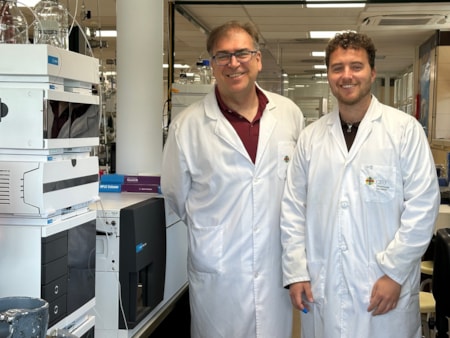
Childhood obesity continues to be a major public health challenge both in Spain and worldwide, although awareness of the problem has been growing for years, both in public and private institutions. There is a great deal of research on the subject that addresses different aspects, from the origin and evolution of the problem (including the associated genetic, social, economic and behavioural factors) to possible treatments.
In this line, the research team of the Centre for Metabolomics and Bioanalysis (CEMBIO) of the CEU San Pablo University, the Niño Jesús University Children's Hospital and the Rey Juan Carlos University have provided a novel approach to study the origin of childhood obesity based on parameters that can be measured in the blood. Thanks to
the capabilities of multiplatform metabolomics and advanced statistical analysis techniques, it has been possible to select a set of biomarkers that have made it possible to identify up to three previously undescribed metabolic subtypes (metabotypes) of childhood obesity. Thanks to the experience of the Hospital's group of researchers in obesity of genetic origin (monogenic), as they are co-leaders of the European collaborative study group, it has been possible to demonstrate that these metabotypes are not related to known genetic variants. ‘The selection of biomarkers can help to classify the type of obesity and therefore identify the best treatment for each type,’ says the principal investigator (PI) of the project at CEMBIO, Fco Javier Rupérez.
These results have recently been published in the article ‘Identifying subgroups of childhood obesity by using multiplatform metabotyping’ in the journal Frontiers in Molecular Biosciences, and provide a solid base for the development of more effective and personalised therapeutic strategies, which could transform the management of childhood obesity in the future.
Metabolomics research
This research, in which metabolomics, clinical practice and advanced statistical techniques for the analysis of the data obtained go hand in hand, counts on the close collaboration between CEMBIO researchers Fco. Javier Rupérez and David Chamoso; Jesús Argente and Gabriel Martos, from the Paediatrics and Endocrinology Department of the Hospital Infantil Universitario Niño Jesús, and Francisco Rabadán, from the Applied Statistics Department of the Universidad Rey Juan Carlos.
Funded by the Ministry of Science, Innovation and Universities and the Health Research Fund (FIS) of the Carlos III Health Institute, this project deepens the understanding of the metabolic alterations associated with childhood obesity and the possibilities of personalised, non-pharmacological interventions.
Evaluation of the ketogenic diet
Another of the findings is related to treatments based on nutritional intervention: diets. Maintaining a ketogenic diet for four months led to weight reduction in children, which was maintained for up to twelve months. Metabolomic study has shown that this weight reduction was associated with dramatic changes in metabolism, which are maintained up to nine months after the end of treatment, although not in all patients. This has allowed the identification of a panel of biomarkers that, before starting treatment, could be related to the prediction of success and the selection of the most appropriate treatment for each patient.
The principal investigator of the CEMBIO project highlights the importance of these multidisciplinary collaborations in dealing with a problem as complex as childhood
obesity. ‘Our goal is to improve treatment accuracy and patient adherence by identifying predictive markers that allow us to select the most appropriate interventions for each individual,’ says Rupérez.
This work represents a significant step towards understanding and treating childhood obesity, and underlines the importance of collaborative, multidisciplinary research in the search for innovative solutions to public health problems.